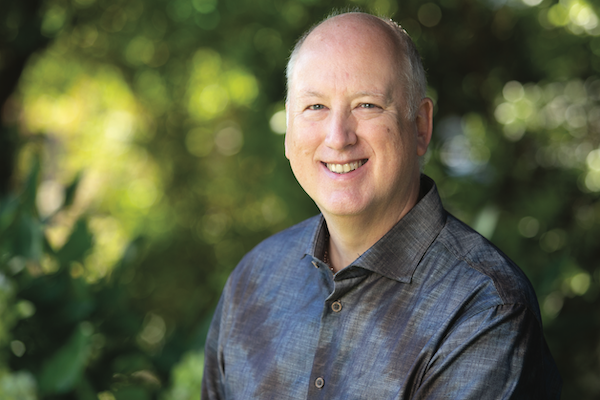When Prostate Cancer Strikes
by Gogs Gagnon
My name is Gogs Gagnon. I’m a retired computer programmer. I’ve developed games for Apple Computer, utility software for IBM, and real estate applications for the government of British Columbia. My proudest achievement is developing the first income tax program approved for personal use by Revenue Canada.
A few years after my retirement, I was diagnosed with prostate cancer.
I was 57 years old, had no symptoms, and was in great shape. I rode my bike every day, worked out in the gym, and trained in martial arts. Needless to say, my cancer diagnosis was a complete shock.
Getting Diagnosed
About five years before my diagnosis, my doctor recommended that I have annual checkups. Being in my early 50s, I agreed it would be good to check my vitals regularly. That’s when I first heard about the PSA test. Unfortunately, my results were above normal. A digital rectal examination revealed I had an enlarged prostate, which is typical for men as they age. My doctor recommended we continue to monitor my PSA.
My PSA continued to rise year after year. Other than an enlarged prostate, I had no symptoms. I was sleeping through the night, had no trouble in the bathroom, and my sex life was good. However, due to the rising PSA, my doctor recommended a prostate biopsy. At the time, I didn’t realize that the biopsy was blind. Meaning the doctor would take random tissue samples from areas where cancer most likely grows. The results of the blind prostate biopsy were negative for cancer.
However, my PSA continued to rise over the years. By this time, I had found a new doctor. After an examination, she confirmed I had an enlarged prostate but said it felt very smooth with no lumps. And since my earlier biopsy was negative, she recommended an MRI. Something I wish I had known about years earlier to avoid the blind biopsy. The MRI revealed a significant anomaly located outside the reach of the digital rectal examination. Another prostate biopsy, this time targeted, was positive for cancer.
Deciding on a Treatment Plan
After hearing the news, I immediately thought the worst and felt an urgent need to get rid of the cancer growing inside me. Before learning all the facts, I asked for surgery. I’m grateful my doctor told me to slow down. It was much too early to make a decision. More tests were needed, and there were many options to consider. My doctor strongly recommended I seek multiple opinions and visit the cancer clinic.
Thinking back on this moment, I now realize I was in shock. What I needed was time to recover from hearing the word cancer before moving forward too quickly.
Thinking back on this moment, I now realize I was in shock. What I needed was time to recover from hearing the word cancer before moving forward too quickly. It’s best to be in a good headspace and to have all the facts before deciding on a course of treatment. It’s not a decision to take lightly.
In my case, I decided to go with surgery, and it went without complication. The tumor was massive. More importantly, my cancer was already in the final stage before escaping the prostate even though I had no symptoms. I’m grateful my doctor recommended regular PSA testing. Without monitoring, I wouldn’t have known my PSA was rising. And my cancer most likely would have spread before I developed noticeable symptoms.
Physical Recovery & Emotional Healing
My recovery has been good. I’m fortunate to have avoided long-term physical side effects. I regained urinary control within six weeks. And my erections returned after 17 months. They’re not as spontaneous and not always reliable; however, I’m grateful to have a very loving and supportive spouse.
Although I was aware of surgery’s potential physical side effects, my healthcare team didn’t warn me about the emotional side effects. For me, the emotional side effects can be more brutal than the physical. Every time I have a new ache or pain or a follow-up test, I fear recurrence.
To help me cope, I found researching and writing incredibly therapeutic. So much so that I wrote a book sharing intimate details of my diagnosis, treatment, and recovery, and outlining the things I would have done differently. I’m proud to say that Prostate Cancer Foundation BC distributes a free copy of my book to anyone newly diagnosed with prostate cancer anywhere in Canada. Knowing others may be helped by reading my words is incredibly heartwarming.
Gogs Gagnon is the author of Prostate Cancer Strikes: Navigating the Storm, an executive member of the BC Support Group Council for the Prostate Cancer Foundation BC in British Columbia, Canada, and a community advocate and writer for Health Union. You can follow Gogs’ blog at gogsgagnon.com, subscribe to his YouTube channel at youtube.com/c/gogsgagnon, and connect with him on Twitter, Facebook, LinkedIn, and Instagram at @gogsgagnon.
This article was published in Coping® with Cancer magazine, January/February 2022.
Everyone has a unique story to share. Do you want to share your survivor story?
We consider a cancer survivor to be anyone living with a history of cancer –
from diagnosis through the remainder of life.
Here are our submission guidelines.


